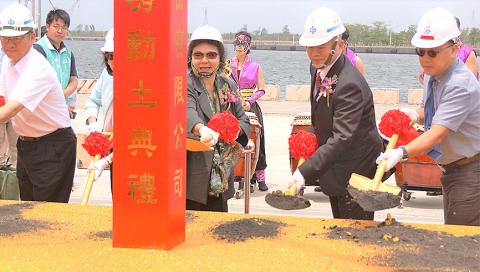China Steel Corp (CSC, 中鋼) yesterday broke ground in Kaohsiung’s Singda Harbor (興達港) for a plant to construct undersea foundation facilities for offshore wind turbines.
China Steel said it expects to complete construction of the plant in the Marine Technology Industry Innovation Zone (海洋科技產業創新專區) at the end of next year and begin mass production of 50 to 60 jacket foundations annually, starting in 2020.
President Tsai Ing-wen’s (蔡英文) administration is promoting offshore wind farms as part of its plans to expand renewable energy generation to help relieve the strain on electricity supplies from state-run Taiwan Power Co (Taipower, 台電).

Photo: CNA
In light of the potential demand for undersea foundation facilities for offshore wind turbines, China Steel’s board approved investing NT$3.42 billion (US$116.72 million) to set up a company to take charge of the plant’s construction, the company said on March 28.
Last month the company announced it was teaming up with Copenhagen Infrastructure Partners and the Changhua County Government to develop three offshore wind farms on the west coast, with a total investment of more than NT$210 billion.
SIGNING CEREMONY
Cheng Ching-chung (程慶鐘), commissioner of China Steel’s wind power business development committee and chairman of the new company, signed a cooperation agreement with representatives of 11 supply-chain firms at yesterday’s ceremony, including CSBC Corp, Taiwan (台灣國際造船) chairman Cheng Wen-lon (鄭文隆).
Minister of Economic Affairs Shen Jong-chin (沈榮津) and Kaohsiung Mayor Chen Chu (陳菊) attended the ceremony, along with China Steel chairman Wong Chao-tung (翁朝棟).
The government wants to see 5.5 gigawatts of electricity generated by offshore wind farms by 2025, Shen said.
The Ministry of Economic Affairs would start the selection process for offshore wind farm projects this week, he said.
Seven of the 11 suppliers are based in Kaohsiung, which highlights China Steel’s efforts to localize the development of underwater foundations, Wong said.
The company also wants to build a local supply chain for wind turbines through collaborations with a variety of its business partners, he said.

Stephen Garrett, a 27-year-old graduate student, always thought he would study in China, but first the country’s restrictive COVID-19 policies made it nearly impossible and now he has other concerns. The cost is one deterrent, but Garrett is more worried about restrictions on academic freedom and the personal risk of being stranded in China. He is not alone. Only about 700 American students are studying at Chinese universities, down from a peak of nearly 25,000 a decade ago, while there are nearly 300,000 Chinese students at US schools. Some young Americans are discouraged from investing their time in China by what they see

MAJOR DROP: CEO Tim Cook, who is visiting Hanoi, pledged the firm was committed to Vietnam after its smartphone shipments declined 9.6% annually in the first quarter Apple Inc yesterday said it would increase spending on suppliers in Vietnam, a key production hub, as CEO Tim Cook arrived in the country for a two-day visit. The iPhone maker announced the news in a statement on its Web site, but gave no details of how much it would spend or where the money would go. Cook is expected to meet programmers, content creators and students during his visit, online newspaper VnExpress reported. The visit comes as US President Joe Biden’s administration seeks to ramp up Vietnam’s role in the global tech supply chain to reduce the US’ dependence on China. Images on

New apartments in Taiwan’s major cities are getting smaller, while old apartments are increasingly occupied by older people, many of whom live alone, government data showed. The phenomenon has to do with sharpening unaffordable property prices and an aging population, property brokers said. Apartments with one bedroom that are two years old or older have gained a noticeable presence in the nation’s six special municipalities as well as Hsinchu county and city in the past five years, Evertrust Rehouse Co (永慶房產集團) found, citing data from the government’s real-price transaction platform. In Taipei, apartments with one bedroom accounted for 19 percent of deals last

US CONSCULTANT: The US Department of Commerce’s Ursula Burns is a rarely seen US government consultant to be put forward to sit on the board, nominated as an independent director Taiwan Semiconductor Manufacturing Co (TSMC, 台積電), the world’s largest contract chipmaker, yesterday nominated 10 candidates for its new board of directors, including Ursula Burns from the US Department of Commerce. It is rare that TSMC has nominated a US government consultant to sit on its board. Burns was nominated as one of seven independent directors. She is vice chair of the department’s Advisory Council on Supply Chain Competitiveness. Burns is to stand for election at TSMC’s annual shareholders’ meeting on June 4 along with the rest of the candidates. TSMC chairman Mark Liu (劉德音) was not on the list after in December last